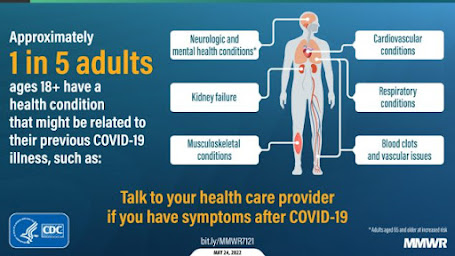Study says one in five adult Covid-19 survivors in the U.S. may develop ‘long Covid;’ for those over 65, it’s one in four

Centers for Disease Control and Prevention Morbidity and Mortality Weekly Report illustration
—–
By Melissa Patrick
Kentucky Health News
One in five adult Americans who have recovered from a Covid-19 infection have experienced a health condition that may be related to a previous infection, and that makes prevention efforts and post-Covid assessments critical, says a Centers for Disease Control and Prevention study.
Among people 65 and older, one in four were found to have a post-Covid condition. The study analyzed a database of electronic health records of nearly 2 million U.S. adults between March 2020 and November 2021, comparing those who had been infected with the coronavirus and those who were not. Of those, more than 350,000 had tested positive for the virus.
The researchers assessed the occurrence of 26 clinical conditions previously attributed to post-Covid illness. They identified a number of post-Covid health problems involving the heart, lungs, kidneys, and vascular, musculoskeletal and neurological systems. People who develop these ongoing conditions after having Covid-19 are often said to have “long Covid,” which has not been precisely defined.
Age groups aside, the study found that the most common health conditions were respiratory symptoms and musculoskeletal pain. Post-Covid patients were also twice as likely as those who had not had the virus to suffer from acute pulmonary embolism and respiratory symptoms.
In addition, the study found that post-Covid patients 65 and older were at greater risk than the younger group of developing neurological conditions and most mental-health conditions.
The study concludes that these findings are consistent with several large studies that indicating “that post-Covid incident conditions occur in 20 to 30 percent of patients.” Also, post-Covid conditions “can affect a patient’s ability to contribute to the work force and might have economic consequences for survivors and their dependents,” and “care requirements might place a strain on health services” in “communities that experience heavy Covid-19 case surges.”